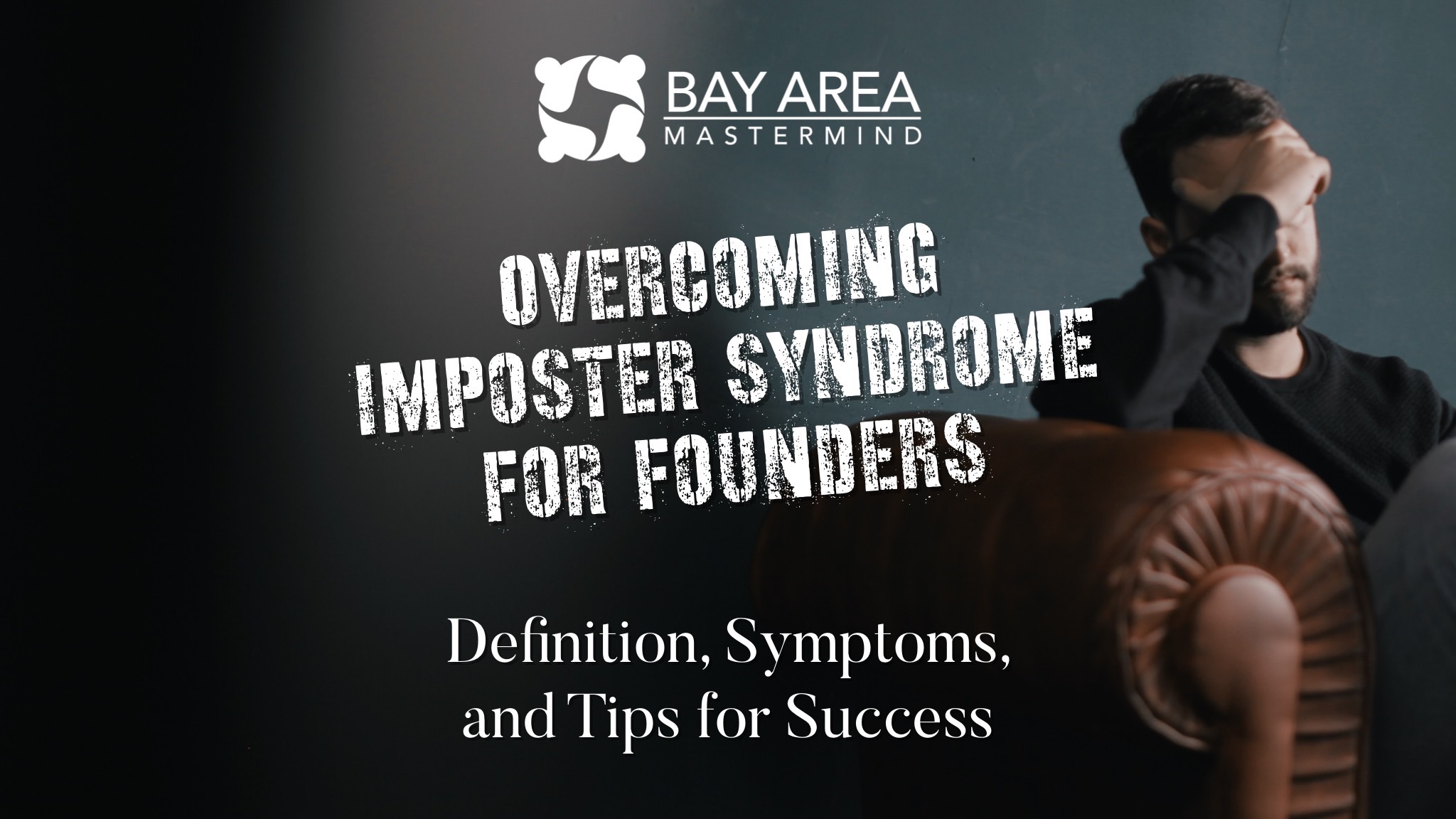
Do you ever feel like you don’t deserve your success in business, despite the world telling you otherwise?
You’re not alone. Imposter syndrome plagues many high-achievers, especially entrepreneurs and founders.
So what is imposter syndrome, its five forms, the root causes, and strategies for overcoming it?
Key Takeaways
We’re going to deep dive into Impostor phenomenon for founders and specifically cover how to:
Recognize and understand imposter syndrome to empower yourself with strategies for success.
Identify the five types of imposter syndrome, causes/triggers, and how it affects you both inside of and outside of your business
Take steps towards overcoming it by challenging negative thoughts, building a support network, practicing self-compassion, and seeking professional help when needed.
Understanding Imposter Syndrome
Imposter syndrome, also known as imposter phenomenon or “impostor syndrome” (note the “o”), is a psychological phenomenon where individuals just like you doubt their abilities and feel like frauds, despite evidence of their success.
This counterintuitive condition was first identified in 1978 by psychologists Clance and Imes, who observed high-achieving women doubting their own accomplishments. Although imposter syndrome can affect anyone, regardless of their profession or level of experience, it has been particularly prevalent with successful founders and entrepreneurs.
Since its discovery, imposter syndrome has gained widespread recognition, affecting approximately 25 to 30 percent of high achievers. It has been associated with feelings of anxiety and depression and, in some cases, may be related to social anxiety disorder. Entrepreneurs with imposter syndrome tend to experience heightened levels of self-doubt and fear of being exposed as a fraud.
What’s encouraging, however, is that it’s possible to conquer imposter syndrome.
Defining Imposter Syndrome
Imposter syndrome is characterized by feelings of inadequacy, self-doubt, and a fear of being exposed as a fraud, despite evidence of competence and success. These imposter feelings can lead to anxiety and depression, which starts a downward spiral of reinforcing the very same feelings.
The Clance Impostor Phenomenon Scale, developed by Pauline Rose Clance, is a useful tool for identifying and measuring the severity of imposter syndrome. Understanding the defining features of imposter syndrome can give you the tools you need to overcome it.
History of Imposter Syndrome
The concept of impostor syndrome was first introduced in a landmark 1978 study by Pauline Rose Clance and Suzanne Imes, who observed high-achieving women who doubted their own accomplishments. These women felt self-doubt and a fear of being exposed as frauds, despite having evidence of their competence and success.
Since then, this imposter phenomenon has been widely acknowledged as a prevalent issue that affects individuals from all walks of life – not just the successful women in the study.
The Impact of Imposter Syndrome on Founders
Founders are no strangers to imposter syndrome, and it can have a significant impact on our mental health, personal relationships, and professional success. It can lead to anxiety, depression, burnout, and even self-sabotage, hindering both progress and growth.
Identifying the negative effects of impostor syndrome allows entrepreneurs to address these challenges and set the stage for increased success.
Sheryl Sandberg, the COO of Facebook, is a well-known entrepreneur who has openly spoken about her experiences with imposter syndrome. Despite her incredible success, Sandberg admitted in her best-selling book, “Lean In: Women, Work, and the Will to Lead“, that she often felt like a fraud and didn’t deserve her achievements. She wrote, “Every time I was called on in class, I was sure that I was about to embarrass myself. Every time I took a test, I was sure that it had gone badly. And every time I didn’t embarrass myself — or even excelled — I believed that I had fooled everyone yet again. One day soon, the jig would be up.”
Another notable example of a successful entrepreneur who has grappled with imposter syndrome is Howard Schultz, the former CEO of Starbucks. Schultz has been open about his struggles with self-doubt, despite his incredible achievements in transforming Starbucks into a global brand.
In an interview with The New York Times, Schultz said, “Very few people, whether you’ve been in that job before or not, get into the seat and believe today that they are now qualified to be the CEO. They’re not going to tell you that, but it’s true.”
The experiences of Sandberg and Schultz demonstrate that even the most successful entrepreneurs are not immune to imposter syndrome. However, with the right awareness and coping mechanisms, these feelings of self-doubt and inadequacy can be overcome. Schultz’s journey in particular serves as a powerful testament that it’s possible to wrestle with imposter syndrome, yet still lead with confidence and succeed.
Mental Health Effects
The mental health effects of imposter syndrome, including mental health issues such as anxiety, depression, and burnout, can hinder professional growth and success. These feelings of inadequacy and self-doubt can contribute to a vicious imposter cycle of negative thoughts and emotions, making it difficult for founders to reach their full potential.
Acknowledging the mental health impact of imposter syndrome on you as a founder paves the way for implementing strategies that can improve your well-being.
Personal Relationships
Imposter feelings can strain personal relationships in a few key ways:
Founders may struggle with feelings of inadequacy and fear of failure.
This constant self-doubt can lead to a lack of trust and communication within relationships – both inside of your company and out.
It can make it difficult to maintain healthy connections – think prospects, partners, employees, and investors
Professional Success
Business and professional success can be hindered by imposter syndrome, as you may find yourself avoid taking risks, seeking new opportunities, or not fully embracing your achievements in your business. This self-doubt can lead to a lack of motivation and difficulty in pursuing ambitions, ultimately limiting your potential for success.
Imposter Syndrome in the Profoundly Gifted
Executive Coach, George Sudarkoff, works with the “Twice Exceptional” profoundly gifted and he sees this come up often in the context of self confidence with his clients.
“Imposter Syndrome is a story we tell ourselves, a mental habit. A mistake most people make is thinking that they can push their Imposter Syndrome away, or overpower it with affirmations or something. As a result, when the Imposter Syndrome strikes, they resist it. All that accomplishes is to make the feeling linger longer and embed itself into your psyche deeper.”
There are solutions, however that work for both the profoundly gifted, and the every day entrepreneur alike.

Identifying the Five Types of Imposter Syndrome
Identifying the Five Types of Imposter Syndrome
Dr. Valerie Young, an expert on the subject, identified five types of imposter syndrome:
The perfectionist
The natural genius
The soloist
The expert
The superhero
Each type has distinct characteristics and behaviors, which can help individuals recognize their own imposter tendencies and develop strategies for overcoming them.
Understanding these variants allows us to see what shines brightest in ourselves, and to take the best approach.
The Perfectionist
The perfectionist sets unrealistically high standards and focuses on minor flaws, leading to feelings of inadequacy and self-doubt. This type of imposter syndrome can be incredibly motivating, pushing founders to strive for excellence and improvement.
This is classic in the “inventor” archetype of entrepreneur who is constantly tinkering, working on the “next best mousetrap”, but never shipping it.
The Natural Genius
The natural genius expects to excel without effort and feels like a fraud when faced with challenges or setbacks. This type of imposter syndrome can lead to feelings of inadequacy and low self-esteem, as natural geniuses believe that their success should come effortlessly and they may feel like a fraud when it doesn’t.
Identifying this mindset and accepting the fact that success typically results from hard work and commitment can assist natural geniuses in overcoming this type of impostor syndrome.
The Soloist
The soloist – or the “lone wolf” believes they must handle everything alone and views asking for help as a sign of weakness or failure. This type of impostor syndrome can lead to feelings of isolation, burnout, and difficulty in forming meaningful relationships.
Acknowledging the importance of collaboration and seeking support from others – for example in a founders peer advisory group – can help you overcome the soloist type of imposter syndrome.
The Expert
The expert feels the need to know everything and constantly seeks more knowledge, fearing exposure as a fraud if they lack expertise. This type of imposter syndrome can lead to feelings of inadequacy and insecurity, as these founders believe that their success is only achieved through hard work and dedication.
Acknowledging the significance of ongoing learning and growth – or “kaizen” as we call it – can assist in overcoming the ‘expert’ type of imposter syndrome.
The Superhero
The superhero pushes themselves to the limit in all aspects of life, often leading to burnout and feelings of inadequacy. This type of impostor syndrome can result in exhaustion and a sense of not being good enough, as superheroes believe that success is only achieved through extraordinary effort and dedication.
Recognizing the significance of balance and self-care can help you get past the ‘superhero’ type of fraud syndrome.

Causes and Triggers of Imposter Syndrome for Entrepreneurs
Causes and Triggers of Imposter Syndrome for Entrepreneurs
Family dynamics, personality traits, and social pressures are often at the root of imposter syndrome for entrepreneurs. Understanding these external factors enables us to choose the right strategies that to use internally in overcoming impostor feelings.
Upbringing and Education
Often we fall back to what we were taught growing up and in school – even if it makes us doubt our own abilities, our own merits, and our self worth.
Bay Area Mastermind member, Ann Rea, of Making Art, Making Money, who has coached thousands of artists, shares how her students earlier in their education wrongly learned that, “they don’t have to, and should not try, to ‘sell themselves’. If they do, then they will feel conflicted at best.”
Family Dynamics
Family dynamics, such as high expectations or criticism, can contribute to the development of impostor syndrome. Recognizing these influences and addressing them can help to build a more accurate perception of your abilities and achievements.
Personality Traits
Certain personality traits, like perfectionism (see “perfectionist” above) and high sensitivity, can make individuals more susceptible. By understanding these traits, you can learn to manage you imposter tendencies and develop strategies for overcoming them.
Social Pressures
Social pressures, including societal expectations and workplace culture, can exacerbate feelings of inadequacy and self-doubt. Recognize the impact of these pressures and develop strategies (see below) to manage.

Strategies for Overcoming Imposter Syndrome
Strategies for Overcoming Imposter Syndrome
Overcoming imposter syndrome involves acknowledging and challenging negative thoughts, establishing a support network, practicing self-compassion, and seeking professional help when necessary.
Implementing these strategies enables you to:
Reframe your beliefs
Cultivate a more accurate perception of your abilities
Overcome imposter syndrome
On mindfulness, George shares “A mindfulness practice lets you notice this story as an impartial observer and let it pass through without identifying with it. When you let it pass through you without clinging to or identifying with it, it comes and goes like clouds in the sky, without leaving a trace.”
Acknowledging and Challenging Negative Thoughts
Acknowledging and challenging negative thoughts can help individuals reframe their beliefs and develop a more accurate perception of their abilities. Recognizing and challenging these thoughts can provide individuals with clarity on their self-doubt and fear of exposure, ultimately diminishing the impact of impostor syndrome and bolstering self-confidence.
Building a Support Network
Building a support network of peers, mentors, and loved ones can provide encouragement, validation, and perspective to help combat imposter syndrome. Having a strong support system can offer invaluable insights, appreciation, and motivation, assisting individuals in overcoming impostor syndrome and achieving their goals.
Practicing Self-Compassion
Practicing self-compassion involves treating oneself with kindness and understanding, recognizing that everyone makes mistakes and experiences setbacks.
Treating ourselves kindly and accepting our imperfections can lessen the impact of imposter syndrome, fostering self-confidence and resilience.
Bay Area Mastermind Member, Amadeus Ciok, of Learn Vibrant, shares how he was experiencing imposter syndrome early on as a founder. “When I would mess up or when we didn’t get the results we were aiming for, I would try to pretend it didn’t happen and it was very awkward. I don’t know at what point, but I realized that the best and easiest way is: straight up admit you messed up (bring it up yourself), fix the issue (as much as you can), move forward promising that either it will never happen again, or you will do everything in your power to not let it happen again.”
When to Seek Professional Help
It’s not uncommon for us entrepreneurs to experience imposter syndrome and experience anxiety, but if you find it’s happening often or has become debilitating, you may want to seek an official diagnosis or get therapeutic intervention.
Seeking professional help, such as therapy or counseling, can be beneficial if you’re struggling with severe or persistent imposter syndrome. A qualified professional can provide the necessary support and guidance to help you manage imposter syndrome.
Real-Life Success Stories Despite Imposter Syndrome
Beyond the well known business moguls and Bay Area Mastermind members covered above, another great story comes from Carol Lathbridge and Lola Cawood. Carol and Lola are two inspiring examples of co-founders who have triumphed over imposter syndrome and achieved remarkable success in their business. As the founders of Tiwani Heritage, a sustainable hair extensions and lifestyle brand, they overcame imposter syndrome by confidently embracing their own voice and uniqueness.
Their story serves as a powerful reminder that it is possible to overcome imposter syndrome and achieve professional success despite feelings of self-doubt and inadequacy.
Putting It All Together
In conclusion, imposter syndrome is a common psychological phenomenon that can impact entrepreneurs and founders in many ways. By understanding its types, causes, and strategies for overcoming it, you, too, can conquer self-doubt and embrace your achievements.
Remember that you are not alone in your struggles with imposter syndrome, and with the right support and mindset, you can overcome it and achieve great success.
Frequently Asked Questions
Imposter syndrome is a nagging feeling of anxiety and self-doubt, even when your performance is externally recognized as successful. You feel like you are constantly bluffing and doubt that you deserve any successes. Your mind makes you question whether you really belong in the situation or if you’re just “faking it.”
Imposter Syndrome comes in five main types; Perfectionist, Superhuman, Natural Genius, Soloist and Expert. These types make it hard for us to appreciate our successes and cause us to experience a range of negative emotions such as feeling like a fraud or fear of failure. Imposter Syndrome can be debilitating, but there are ways to manage it. It is important to recognize the signs and symptoms of Imposter Syndrome and to take steps to address them. This can include talking to a mental health professional.
Imposter Syndrome can be caused by a variety of factors, such as family dynamics and societal pressures to achieve. Growing up in a family that emphasizes success and praise mixed with criticism can play a role in the development of this syndrome. So it’s important to be mindful of these influences and take care of yourself.
Leaders can easily identify signs of imposter syndrome in themselves – and their teams – by looking out for the four P’s – perfectionism, paralysis, people-pleasing and procrastination. Knowing these indicators can help you as a founder create a more positive and productive work environment.
Imposter syndrome is the self-doubt and fear of being exposed as a fraud despite evidence to the contrary. It’s an emotional reaction that many successful people experience.
Who’s Your Peer Advisory Group?
Who do you bounce ideas off with, get expert insights from, and share resources with?
Are you ready to connect with like minded Business Owners, Founders, and Entrepreneurs who’ve “been there, done that” ?
Join us at the Bay Area Mastermind for a Test-Drive and see if our Mastermind is what you’ve been missing.
Further Reading:



